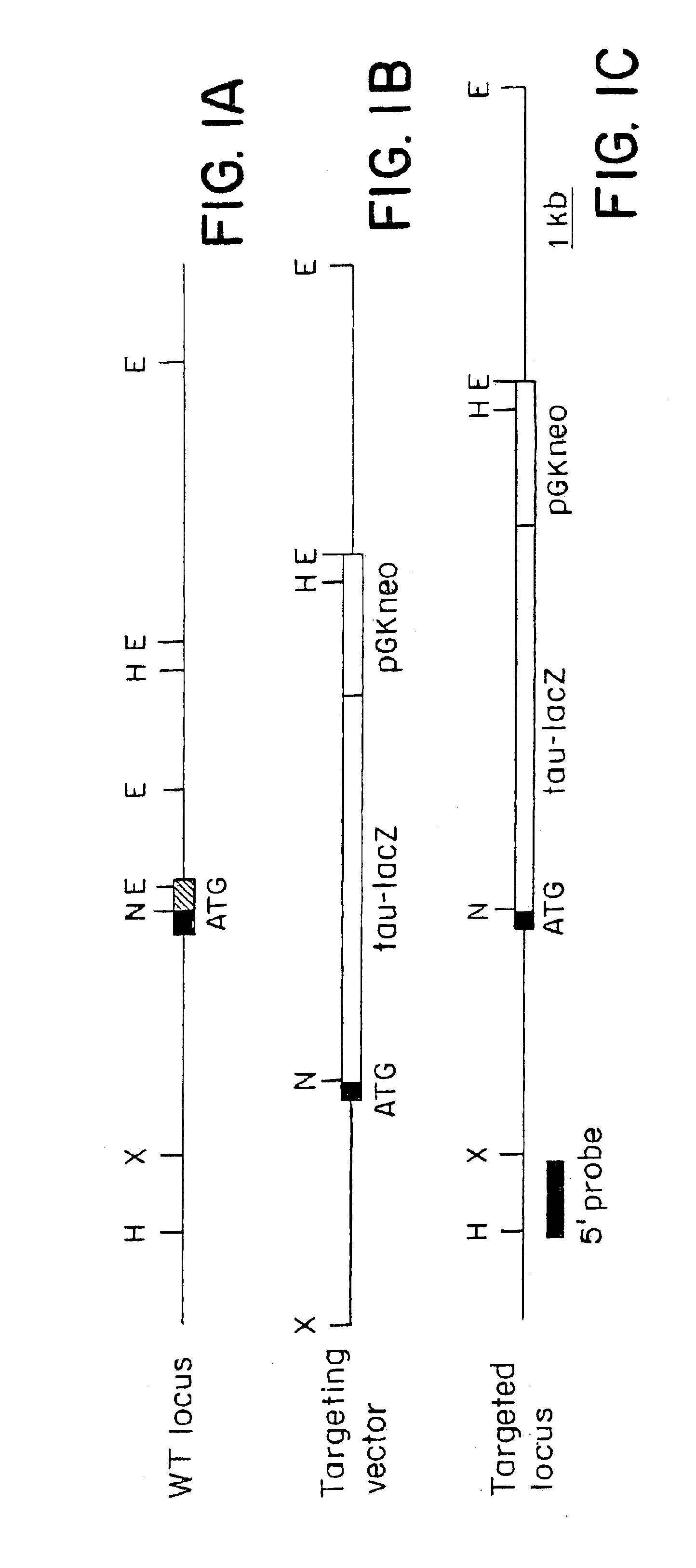Artery- and vein-specific proteins and uses therefor
a technology of specific proteins and arteries, applied in the field of arterialand veinspecific proteins, can solve the problems of morbidity and mortality in modern society, disorder of the circulatory system, etc., and achieve the effect of enhancing or inhibiting the effect and the function of the molecular marker
- Summary
- Abstract
- Description
- Claims
- Application Information
AI Technical Summary
Benefits of technology
Problems solved by technology
Method used
Image
Examples
example 1
Targeted Mutagenesis of EphrinB2 in Mice
[0076]Targeted disruption of the EphrinB2 gene was achieved by homologous recombination in embryonic stem cells. The targeting strategy involved deleting the signal sequence and fusing a tau-lacZ indicator gene in frame with the initiation codon. The expression pattern of β-galactosidase in heterozygous (EphrinB2tlacZ / +) embryos was indistinguishable from that previously reported for the endogenous gene. (Bennett, B. D. et al. Proc. Natl. Acad. Sci. USA 92: 1866-1870 (1995); Bergemann, A. D. et al. Mol. Cell. Bio. 1995:4921-4929 (1995); Wang, H. U. and Anderson, D. J. Neuron 18:383-396 (1997)). While prominent expression was detected in the hindbrain and somites, lower levels were observed in the aorta and heart as early as E8.25. Expression in the yolk sac was first detected at E8.5. Heterozygous animals appeared phenotypically normal. In homozygous embryos, growth retardation was evident at E10 and lethality occurred with 100% penetrance aro...
example 2
Reciprocal Expression Pattern of EphrinB2 and EphB4 in Arteries and Veins
[0077]The enlarged heart observed in dying mutant embryos prompted examination of the expression of EphrinB2tlacZ in the vascular system in detail. Expression was consistently observed in arteries but not veins. In the yolk sac, for example, the posterior vessels connected to the vitelline artery, but not the vitelline vein, expressed the gene, as detected by lacZ staining. In the trunk, labeling was detected in the dorsal aorta, vitelline artery, umbilical artery and its allantoic vascular plexus, but not the umbilical, anterior and common cardinal veins (the umbilical vein is labeled with anti-PECAM-1 antibody). In the head, labeling was seen in branches of the internal carotid artery, but not in those of the anterior cardinal vein. In situ hybridization with EphrinB2 cDNA probes confirmed that the selective expression of tau-lacZ in arteries correctly reflected the pattern of expression of the endogenous gen...
example 3
Vasculogenesis Occurs Normally in EphrinB2 Mutant Embryos
[0078]The formation of the major vessels in the trunk was unaffected by the lack of EphrinB2, as examined by lacZ and PECAM-1 double staining of 9 somite embryos. Expression of EphrinB2-lacZ was seen in the dorsal aorta and vitelline artery, but not the umbilical and posterior cardinal veins. The dorsal aorta, vitelline artery, posterior cardinal and umbilical veins, for example, formed, although some dilation and wrinkling of the vessel wall was observed. Similarly the intersomitic vessels originating from the dorsal aorta formed at this stage. Between E8.5 and E9.0, the primitive endocardium appeared only mildly perturbed in mutants, while a pronounced disorganization was apparent at E10. Red blood cells developed and circulated normally up to E9.5 in both the mutant yolk sac and embryo proper.
PUM
| Property | Measurement | Unit |
|---|---|---|
| pH | aaaaa | aaaaa |
| fluorescence | aaaaa | aaaaa |
| blood pressure | aaaaa | aaaaa |
Abstract
Description
Claims
Application Information
 Login to View More
Login to View More - R&D
- Intellectual Property
- Life Sciences
- Materials
- Tech Scout
- Unparalleled Data Quality
- Higher Quality Content
- 60% Fewer Hallucinations
Browse by: Latest US Patents, China's latest patents, Technical Efficacy Thesaurus, Application Domain, Technology Topic, Popular Technical Reports.
© 2025 PatSnap. All rights reserved.Legal|Privacy policy|Modern Slavery Act Transparency Statement|Sitemap|About US| Contact US: help@patsnap.com

